Le problème ” Erreur trop de redirections ” est une erreur WordPress qui peut être causée par une extension ou des réglages incorrects. En fait, c’est l’une des erreurs les plus courantes rencontrées par nos lecteurs et d’autres utilisateurs de WordPress.
Cette erreur peut même vous empêcher d’accéder à votre site, ce qui la rend difficile à résoudre. Heureusement, nous avons dépanné le problème des redirections trop nombreuses à plusieurs reprises, et nous savons donc exactement quoi faire.
Dans cet article, nous allons vous afficher comment corriger facilement le problème ” Erreur trop de redirections ” sur WordPress. Nous couvrirons également la façon de regagner l’accès à votre site et de dépanner l’erreur.

Conseil d’expert : Vous préférez confier le dépannage à des professionnels ? Nos services d’assistance WordPress peuvent corriger votre erreur en un rien de temps et remettre votre site en état de marche. De plus, nous proposons des correctifs ponctuels, vous n’avez donc pas à vous soucier des contrats en cours.
Quelle est la cause de l’erreur “Trop de redirections” dans WordPress ?
L’erreur “trop de redirections” est due à une mauvaise configuration des redirections dans WordPress.
Comme vous le savez peut-être déjà, WordPress dispose d’une fonctionnalité de structure d’URL favorable au référencement qui utilise la fonction de redirection. De même, de nombreux plugins WordPress populaires utilisent cette fonctionnalité pour configurer des redirections temporaires, créer des redirections 301 permanentes et corriger les erreurs 404.
Si vous utilisez une extension pour corriger le problème de contenu non sécurisé SSL ou une extension de mise en cache WordPress, cela peut également affecter les redirections et provoquer l’erreur “trop de redirections”.
Voici à quoi ressemble le message “ERR_TOO_MANY_REDIRECTS” dans Google Chrome.
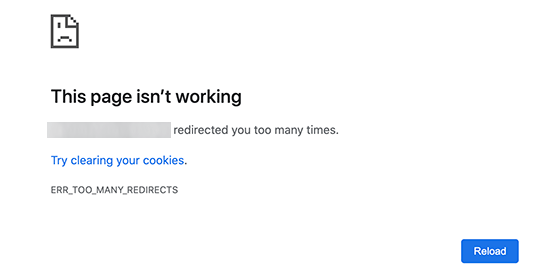
Cependant, cette erreur ne vous indique pas ce qui cause le conflit et force la boucle de redirection dans WordPress.
Voici à quoi ressemble l’erreur dans Firefox avec le message “La page n’est pas redirigée correctement”.
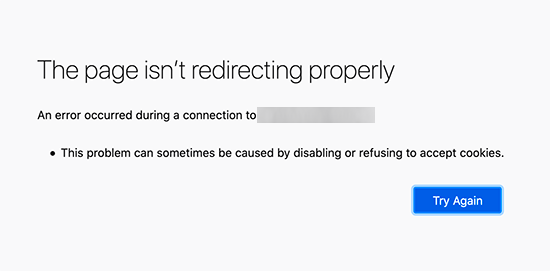
Ceci étant dit, voyons comment corriger l’erreur trop de redirections dans WordPress.
Nous vous accompagnons dans le dépannage étape par étape, pour accéder à votre site WordPress et éviter que l’erreur ne se reproduise.
1. Effacer les cookies et le cache du navigateur
Une cause fréquente de l’erreur pourrait être les cookies de votre navigateur web. Essayez d’accéder à votre site en utilisant un autre navigateur web, comme Firefox, Safari, Opera ou Microsoft Edge.
Si vous pouvez accéder à votre site normalement en utilisant un autre navigateur, vous devez alors effacer les cookies et la mise en cache de votre navigateur habituel.
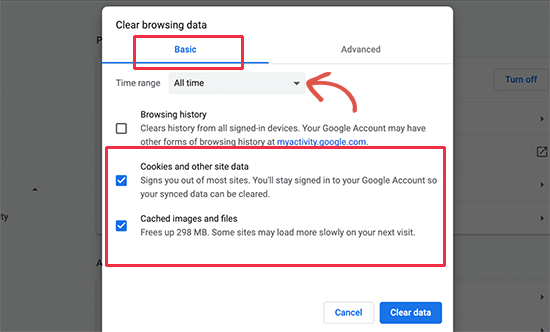
Nous avons un guide détaillé sur la façon de vider le cache de votre navigateur dans tous les principaux navigateurs qui vous aidera à le faire.
En revanche, si la modification du navigateur ne corrige pas le problème, vous pouvez passer à l’étape suivante.
2. Désactiver toutes les extensions WordPress
La cause la plus fréquente des boucles de redirection WordPress ou ‘ERR_TOO_MANY_REDIRECTS’ est un conflit d’extension. Une extension WordPress essayant de configurer une redirection d’une manière qui entre en conflit avec les redirections WordPress par défaut peut provoquer ce message d’erreur.
Pour corriger ce problème, vous devez désactiver toutes les extensions WordPress de votre site. Normalement, il vous suffit d’aller sur la page WordPress ” Tous les plugins “ dans la zone d’administration de WordPress et de désactiver les plugins à partir de là.
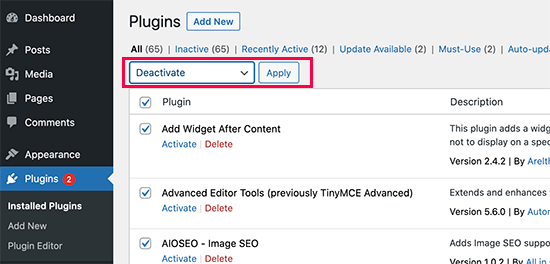
Cependant, nous supposons qu’en raison de l’erreur de redirection, vous ne pouvez pas accéder à la zone d’administration de WordPress.
Dans ce cas, vous devrez désactiver les extensions WordPress à l’aide d’un client FTP comme FileZilla ou de l’application Gestionnaire de fichiers de votre panneau de contrôle de l’hébergeur WordPress.
Il suffit de se connecter à votre site à l’aide d’un client FTP et de se rendre dans le dossier /wp-content/.
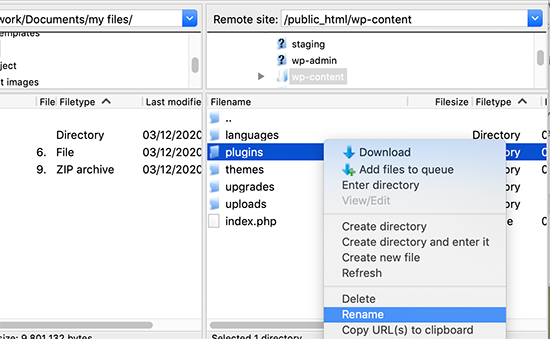
Vous y trouverez le dossier des extensions, que vous devez renommer en “plugins.deactivate”.
Cette opération désactivera toutes les extensions WordPress de votre site.
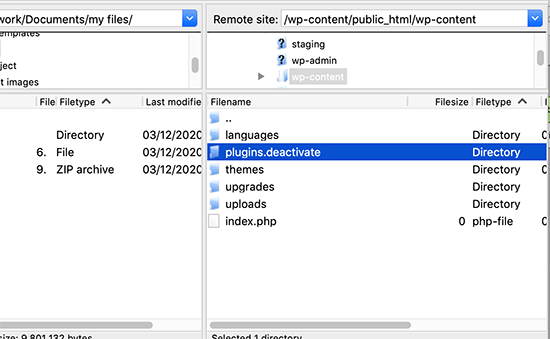
En principe, WordPress recherche un dossier appelé ” plugins" pour charger les fichiers d’extension. Lorsqu’il ne trouve pas ce dossier, il désactive automatiquement les extensions activées dans la base de données.
Vous pouvez maintenant essayer de visiter votre site WordPress. Si vous pouvez vous connecter à la zone d’administration de WordPress, cela signifie que l’une des extensions est à l’origine de l’erreur.
Pour savoir quelle extension est en cause, vous devez revenir au client FTP ou à l’application Gestionnaire de fichiers et renommer votre dossier plugins.deactivate en “plugins”.
Après cela, passez à la zone d’administration WordPress de votre site et allez à la page ” Plugins ” Tous les plugins. À partir de là, vous pouvez activer vos extensions une par une, puis consulter votre site pour voir si vous pouvez reproduire l’erreur.
Une fois que vous avez trouvé l’extension qui est à l’origine de l’erreur, vous pouvez trouver une alternative à cette extension ou signaler le problème au forum de support WordPress de l’extension.
3. Corrigez les URL de WordPress
Une autre cause majeure de cette erreur est une mauvaise configuration des Réglages de l’URL de WordPress. Normalement, vous pouvez voir ces options sur la page Réglages ” Général.
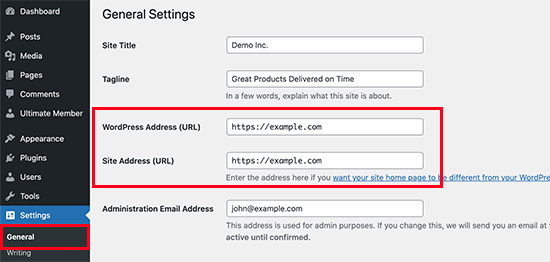
Pour la plupart des sites, les URL des champs “Adresse WordPress” et “Adresse du site” doivent être identiques. Toutefois, certains utilisateurs/utilisatrices peuvent finir par utiliser “www” dans une URL et une URL non www dans l’autre.
Comme vous n’avez peut-être pas accès à la zone d’administration de WordPress, vous devrez peut-être corriger les URL de WordPress à l’aide d’un client FTP ou de l’application Gestionnaire de fichiers.
Connectez-vous simplement à votre site WordPress à l’aide d’un client FTP et rendez-vous dans le dossier /wp-content/themes/your-theme-folder/.

À partir de là, vous devez trouver le fichier functions.php et le modifier à l’aide d’un éditeur de texte simple comme Notepad ou TextEditrices.
Ensuite, vous devez ajouter le code suivant au bas de la page :
1 2 | update_option( 'siteurl', 'https://example.com' );update_option( 'home', 'https://example.com' ); |
N’oubliez pas de remplacer “https://example.com” par les URL de votre propre site. Vous pouvez maintenant enregistrer vos modifications et téléverser le fichier sur votre site.
Ensuite, essayez de visiter votre site pour voir si cela résout l’erreur.
Pour plus de méthodes, consultez notre tutoriel sur la manière de modifier facilement les URL de WordPress.
4. Réinitialiser le fichier .htaccess de WordPress
Le fichier .htaccess est un fichier spécial utilisé par le serveur du site pour gérer les redirections et autres réglages du serveur. WordPress utilise également ce fichier pour les URL favorables au référencement et d’autres redirections.
Il arrive que les extensions WordPress apportent des modifications au fichier .htaccess de votre site, ce qui peut déclencher cette erreur. Il est également possible que le fait de désactiver une extension ne retire pas ces modifications de votre fichier .htaccess.
Dans ce cas, vous devrez réinitialiser manuellement votre fichier WordPress .htaccess.
Là encore, vous devrez accéder à votre site à l’aide d’un client FTP ou de l’application Gestionnaire de fichiers du tableau de bord de votre hébergeur. Une fois connecté, vous verrez le fichier .htaccess dans le dossier racine de votre site.
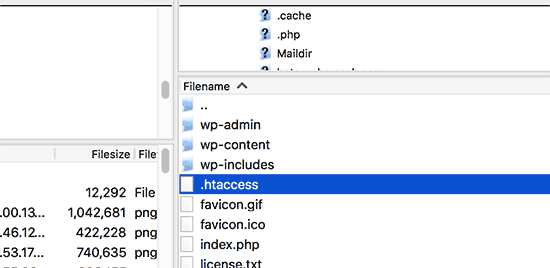
Note : Si vous ne trouvez pas votre fichier .htaccess, consultez notre guide sur la façon de trouver le fichier .htaccess dans WordPress.
Tout d’abord, vous devez télécharger une copie de votre fichier .htaccess sur votre ordinateur à titre de sauvegarde. Ensuite, vous pouvez aller de l’avant et supprimer le fichier de votre site.
Vous pouvez maintenant essayer de visiter votre blog WordPress. Si tout fonctionne normalement, cela signifie que votre fichier .htaccess était à l’origine de l’erreur de redirection.
Puisque nous avons supprimé le fichier .htaccess, vous devez le recréer. Normalement, votre site WordPress peut le faire tout seul. Pour vous en assurer, il vous suffit d’aller sur la page Réglages ” Permaliens et de cliquer sur le bouton ” Enregistrer les modifications ” en bas.
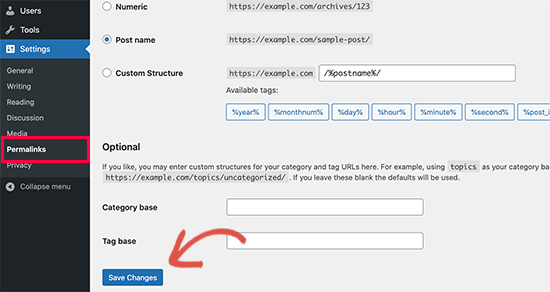
5. Empêcher les erreurs de trop nombreuses redirections dans WordPress
Corrigé, les étapes que nous venons de couvrir ont corrigé le problème de redirection sur votre site. Si elles n’ont pas corrigé le problème, vous devrez peut-être vous adresser à votre entreprise d’hébergement WordPress pour vous assurer qu’il ne s’agit pas d’un problème de serveur.
Une fois qu’ils auront corrigé le problème sur votre site, vous devriez également être en mesure d’en déterminer la cause.
S’il s’agissait d’une extension, alors vous devez signaler le problème au forum de support du plugin. Consultez notre guide sur la façon de demander le support de WordPress. Cependant, si vous ne parvenez pas à obtenir de l’aide, alors vous pouvez toujours trouver une extension alternative qui fait la même chose.
Si l’erreur est due à une mauvaise configuration du site WordPress, vous pouvez en prendre note et vous assurer que les Réglages de votre site sont correctement définis.
Pour plus d’astuces, consultez notre tutoriel détaillé sur la façon de dépanner les problèmes WordPress par vous-même comme un vrai pro de WordPress.
Tutoriel vidéo
Si vous n’aimez pas les instructions écrites, vous pouvez suivre notre tutoriel vidéo à la place :
Nous espérons que cet article vous a aidé à résoudre le problème ” erreur trop de redirections ” sur votre site. Vous pouvez également mettre en favori notre manuel des erreurs courantes de WordPress et voir comment contacter le support de WordPress.
Si vous avez aimé cet article, veuillez alors vous abonner à notre chaîne YouTube pour obtenir des tutoriels vidéo sur WordPress. Vous pouvez également nous trouver sur Twitter et Facebook.





David Najman
Hi,
I had this error on the product tag page. I tried all the possible repairs mantioned above with no luck.
Finally, I had to rename slug for tags not to be numbers, eg. 2016, so I renamed it to r2016 and it started to work!
It must have been caused by some wordpress update, because it have been working few years before with tags named as numbers.
WPBeginner Support
Thanks for sharing what worked for you, if your product page is created by a plugin you may want to try reaching out to the plugin’s support to let them know about that issue
Admin
Yavan Kumar
Hi,
My whole website is running properly, but the homepage is redirected too many times and same issue with the wp-admin page too. I tried all the methods you mentioned but nothing worked for me.
Please advice me if there is any another solution for that.
Thanks in advance…
WPBeginner Support
If none of the methods from the article worked, you would want to reach out to your hosting provider for them to see if there are any issues they can see on their end.
Admin
John Zoetebier
My web site is a Bitnami WordPress deployment on Google Cloud Platform.
When I use:
define(‘WP_SITEURL’, ‘http:/example.cloud’);
the home page gets redirected to itself and browsers error message.
I now use the original Bitnami setting and it works great !
define(‘WP_SITEURL’, ‘http://’ . $_SERVER[‘HTTP_HOST’] . ‘/’);
WPBeginner Support
You are missing a slash next to your http in the first define statement but thank you for sharing your workaround.
Admin
Chad
I had to desactivate a plugin and it worked back fine. I identified the plugin to desactivate by looking into my URL where I was getting a redirect error. The plugin name was written there.
WPBeginner Support
Thanks for sharing how you found the error for others trying to solve this problem
Admin
Nirav Patel
Thanks you bro for information of wp error
WPBeginner Support
Glad our article could help
Admin
irga
yeah, you know,,, i searching for it,,,,, and then mys wordpress site working again, thanksfull
Rahul
Thans buddy , really helps
Josh
I’ve tried all the steps here with no luck today. Luckily my website is functioning ok but I can’t log into the wp-admin dashboard for anything.
What are the other options? There must be other ways I can figure out what’s causing it?
Deby
I’m having the same. My site works fine for visitors, but I only get the redirect error for the backend, my WP dashboard.
It’s a new site and I don’t even have any plugins installed yet. I’m stumped.
Bryant Thomas
Holy Cow That worked, I’ve done many websites migrations and never ran into this issue. Thank you the define(‘WP_HOME’,’http://example.com’);
define(‘WP_SITEURL’,’http://example.com’); worked with the www.
Rutvi Trivedi
Hi, My problem is when I go to my site’s dashboard(/wp-admin) it is giving me this error I tried this solution and unfortunately it is not working. Please help me to solve this error.
Shakeane
I just want to say thank you so much for sharing this knowledge, you wouldn’t understand how much this has helped me, something as minor is adding www or leaving the forward slash at the end has caused so many headaches, thank you so much.
Marc
Awesome! Only took 5 minutes and fixed!!!
hassan
dear sir,
i have huge data on my website i change my address directly from http://www.example.com to example.com i remove www from wp-confiq and phpmyadmin without doing the above procedure, now i update all the plugin and theme everything is fine but my theme setting is not editing when i am going to change setting of my theme the changes reverting …please help how to solve this problem i will be thankful to you
i am trying to solve this problem from three days but fail
please help
Sachin
Hi, my website is running without any error but i have this issue in backend when i open appearance>customize tab. I am unable to customize my website from backend. How can i solve it?
Adrian Daniels
Wow, this actually worked, thanks!!
Toheeb
Hi!
Thank you for your post…
I was able to solve mine changing the WP_SITEURL and WP_HOME to lowercase letters. I capitalized each word formerly for readability and as it turned out, it redirects post paginated pages.
Everything seems fine now. Thank You
Laurena
Hey, this was my problem! Thanks for your comment here.
scott
This was my problem as well.
Karla
This was my problem too! Thanks for your comment! I tried everything in the video but nothing worked.
Rudy Reteig
I made a redirect in ADDOn Domain to rid my site of a tail, “/blog”, behind my URL, appeared when launched the site. This was in my opinion automatically done, as I have two sites on the same PUBLIC_html directory. probably to avoid conflict of files with the same name of the two sites
Robin
None of these fixes worked for me. In the end it turns out I had setup a custom page rule in CloudFlare a long time ago to treat the wordpress dashboard different to the rest of the site. It had “SSL – Flexible” set which causes the error. I just set the rule to “Full” and it works fine again.
Ada
This was the fix for me. Thank you so much!
Damien
Oh God! Thank you so much
Daniel
Thanks a lot for this fix, after like 5 hours on this error, finally solved the issue. I spend more time on fixing errors than building website with wordpress. I’m tired
Simon
Thanks bro. Hours of checking .htaccess etc and its just a simple cloudflare problem.
Rares
This was the solution for me too. Thank you so much for sharing!
Jack
This fixed mine! Thanks!
Jeenie
Same here – once “Flexible” was changed to “Full” in the Cloudflare SSL settings, it worked! Phew. (Wish I saw your comment sooner!)
Nancy
Thank you soooooo much for this! It worked.
Florian
I also had the problem, so I started searching for a solution and found out that the CDN was causing that error. I switched it off and it worked again
Jennifer
Thank God I saw your reply. I thought because I had added the Yoast SEO plugin, it was causing the issues, but I had also activated CDN in my control panel and that was the problem!
Alex Jr
I deactivated all plugins, disabled the current theme, deleted .htaccess, but I’m still getting the “too many redirects” error when I try to access my wordpress site. What is causing it and how can I fix it?
Dan
Just had this happen to me on a new site I’m working on. The issue turned out that I created my child theme with spaces in the name. As soon as I renamed the child theme folder to my-child-theme it worked. I did have to go and make my child theme active again to make it work right. Hope this saves someone so grief and aggravation!
ANA
Dan, I just wanted to say THANK YOU!!!!!!!
That was my problem too, apparently. I changed the name and folder to include a dash and everything works fine.
Santiago
I’m finding that when I try to set my Permalink to Post Name I get the redirect issue. When I set it to Plain, no issues. I’ve disabled all the plugins and still the same thing.
I’m new to WP but 20+ years IT, any help would be greatly appreciated.
Damion
+1 on this and thank for for so thoroughly and generously sharing your knowledge – you saved me hours of work today.
Bilal Asghar
This is a really helpful article. I had the redirection issues with my WordPress website. I just changed my Post URLS going to Setting>Permalinks.
Ebad Ur Rehman
My site is redirected too many time in the preview of customization
other functions of theme are working fine.
please tell the solution for the problem
Sharon Booker
Thank you so much. I called my hosting service help desk twice and nothing they told me to do helped. This fixed the error.
Amit Khandelwal
I’m getting “ERR_TOO_MANY_REDIRECTS” problem only on website Home page but other pages working fine. I think plugin “Redirection” create this problem but it’s my need to keep activate this.
Please suggest.
Tenzin Nima
Thank you so much!! I have been looking for solution for whole day and finally solved it.
Thank you
maria
ive tried the first option, Settings » General and changed the url. the thing is, i accidentally put a ; instead of a . on the adress.
Now the site is all messed up and i cant even login on the admin user anymore, to change it back :/ any tips?
WPBeginner Support
Hi Maria,
You can fix this by adding this code to your WordPress site’s wp-config.php file.
define('WP_HOME','http://example.com');define('WP_SITEURL','http://example.com');1-click Use in WordPress
Don’t forget to replace example.com with your own domain name.
Admin
Yildirim
hi,
what about https
WPBeginner Support
The code is example code, if you are using https then you would put https in the code
Em Walker
Hi, Every time I go to the WIDGET page to load my adsense ads then my page freezes up and becomes unresponsive, how can I fix this, please
Mark
Thank you that worked
Abiskar Bharati
I tried all the things mentioned in the blog but issue still persisted so I did what Jake Philips(one of the comment above) did and I found that something had changed the permalink structure setting to:
/’/%year%/%monthnum%/%day%/%postname%/’
I changed it back to (as the comment suggests) :
/%year%/%monthnum%/%day%/%postname%/
and then everything was working fine again…
Abhishekh Maharjan
Thank You. It worked
Cindy
When I put my link on Facebook my photo that’s on my webpage does not come up just my website name and URL. Any idea what I need to do to have a thumbnail photo?
Felix
Hi, CINDY.
That’s because you didn’t use Yoast plugin, and didn’t set the rules on Facebook tab. The issue is related to open graph protocol.
Khori Carnes
Hi. I am having a some what odd issue, i feel. My redirect issue is that when i attempt to access my wordpress admin page using my domain, it redirects me to godaddy.com. my only explanation I can come up with is that i purchased my domain name from godaddy. However i purchased my web hosting from hostgator. Regardless, i can not access my admin page for wordpress to begin establishing my new website.
Any and all help or suggestions would be greatly appreciated! Thanks
WPBeginner Support
Hi Khori,
You can contact GoDaddy support and they can help you point out your domain name to your hosting provider. All you need to do is go to your GoDaddy account and point Name Server settings for your domain name to HostGator.
Admin
Ralf
In my case the problem was special characters in the URL. You can’t have those with wordpress. E.g. German umlauts: ÄÖÜ – need to be converted.
Teemu
Yes and no. I succesfully ran a website with “ä” character in there for a few years. But this time this might be the reason why I’m searching help to this problem here with a website that now has the same “ä” character there also…
Don Stewart
I panicked when I could not access my website home screen (though I could the other pages). I messed around with the Settings=>General URL settings, and I saw that the same address appeared as the WordPress URL and the website URL—which meant it was going around in circles, as you pointed out. I fiddled with that for awhile, almost locking myself out of WordPress altogether, but then deactivated several recently installed plugins. Fixed! I’m not sure which plugin caused it—I will investigate that, by omitting the one I think is most likely and one-by-one reactivating the others, but my suggestion is to follow your article from the bottom up. Check out those recent plugins!
Jake Phillips
I had just enabled CDN and SSL in Bluehost for my WordPress site when this started happening. I found that something had changed the permalink structure setting to:
/’/%year%/%monthnum%/%day%/%postname%/’
I changed it back to:
/%year%/%monthnum%/%day%/%postname%/
and then everything was working fine again…
Asma
Hi,
Your article is really good and may be a solution of my recent problem. But I am not a WordPress expert and not enough brave to experiment with my site, though the blog is completely built by myself.
However, I’m seeing the following things from last two days–
“This page isn’t working
m redirected you too many times.
Try clearing your cookies.
ERR_TOO_MANY_REDIRECTS”
I’ve tried many times after clearing cookies, still, I can’t log into my site.
Can you please give a solution?
WPBeginner Support
Hi Asma,
If you have tried steps mentioned above, then you can try our WordPress troubleshooting guide. It will help you figure out what’s causing the issue and how to fix it.
Admin
Adeshola
My problem seemed to be a mixture of plugins and wp-config.php. After deactivating my plugins, I was able to access my site but not my wp-admin area. I fixed this by updating my wp-config with the codes provided above. However, they worked only after I put them before the “/* That’s all, stop editing! Happy blogging. */” line. This was something you guys didn’t include in your tutorial but I found somewhere else. So thanks for everything. My site works now.
George
Just wanted to say this article helped me a great deal… Here’s my case:
WP installed in a directory: domain.com/widget
domain.com .htaccess edited for SEO purposes to say
DirectoryIndex /widget/index.php /widget/
This caused the “too many redirects” issue. Possibly because of the trailing slash in the domain.com .htaccess file??
Anyway, this fixed it:
domain.com .htaccess edited to:
DirectoryIndex /widget
Now it works.
Huzzay for cPanel!!!
Mirjam
My issue is that trying to access the login page keeps giving me a redirect to https:// but my site is in http://. Have tried everything, adding home url to config.php, disabling plugins, renewing .htaccess. There is no redirect defined in CPanel so I’m lost as to why this is happening. The site is available, but I cannot access admin.
Getting a bit hopeless here…
WPBeginner Support
Please contact your WordPress hosting provider, they may be able to help you out.
Admin
Gilbert Stawny
If none of the above works, rename your .htaccess file to htaccess.old or something. Try to log in again.
Talha Wahid
Thanks a lot, Finally i solve it by spending whole week. only adding to the wp-config.com
define(‘WP_HOME’,’http://example.com’);
define(‘WP_SITEURL’,’http://example.com’);
Adrian
One way that you can create the infinite redirect loop is to set WordPress Address and Site Address using camel case, MyExampleWebsite.com for example . The domain part of a URI is supposed to be case-insensitive, the file part has to be case sensitive to cope with case-sensitive file systems. WordPress breaks if you use camel-case.
Adnane
I had the same problem, solved it by going to cpanel then look in the security tab if there is mod security , if yes deactivate it.
That was it for me.
Howard Bussey
Thank you for writing this. I set up redirection with Easy HTTPS Redirection, and ran into the “too many redirections” problem. I solved it by turning off a property in Woo Commerce. In the checkout settings, I had both “force secure checkout” and “force HTTP when leaving the checkout” selected. I unselected the “force HTTP when leaving the checkout”, and no longer see the “too many redirections” problem. I didn’t have to edit any .htaccess file.
Asser
If the issue is happening only when accessing the admin control panel , then look at the wp-admin and check if there is htaccess file in place (www/wp-admin/.htaccess ) and if you find one then rename it and refresh the admin URL (example.com/wp-admin/) and it should work .
Suraj
Simply superb, this resolved the redirect loop issue I was facing, thanks a lot, appreciate the article
Akash Gadiya
Hi, I’ve tried all the troubleshooting options here but nothing seems to work. The last thing I remember doing was to take a full backup using the Backup Wizard on the cPanel. Could that in any way lead to this error (Too many redirects)
Here’s a list of what I’ve done so far to fix this issue:
1) Removed the backup file from the root directory
2) Edited the wp-config file by adding those 2 lines of code, both with and without www
3) Deleted the .htaccess files from the root directory and wp-content folder one at a time
4) Scanned through all the comments to see if there is any possible solution, to no avail
I have sought for the help of the root admin, hopefully we’d be able to fix this ASAP. If you think I’ve missed out on anything or could try anything apart from these, please do let me know.
Thanks
Akash
Akash Gadiy
I could finally fix the problem. It had something to do with the backend I guess. My admin reset the server and that breathed life into my website again. Thanks for this post though. Good luck to all trying to fix this problem. May the force be with you